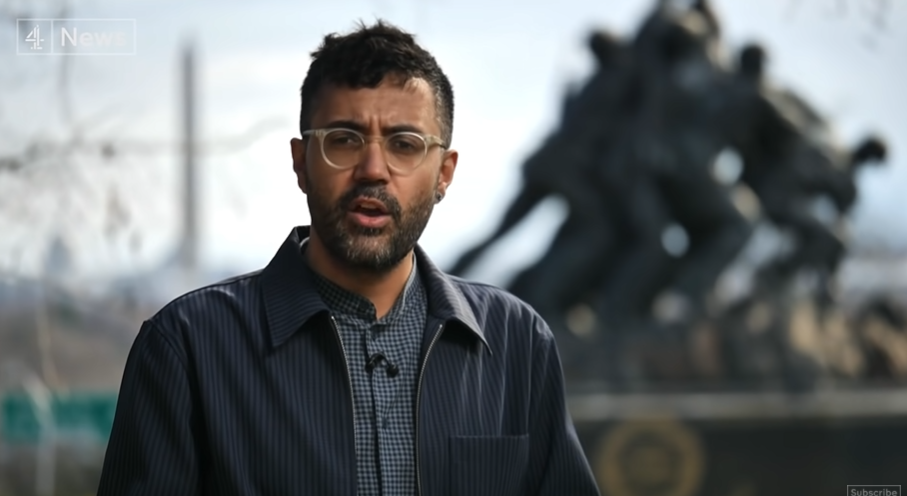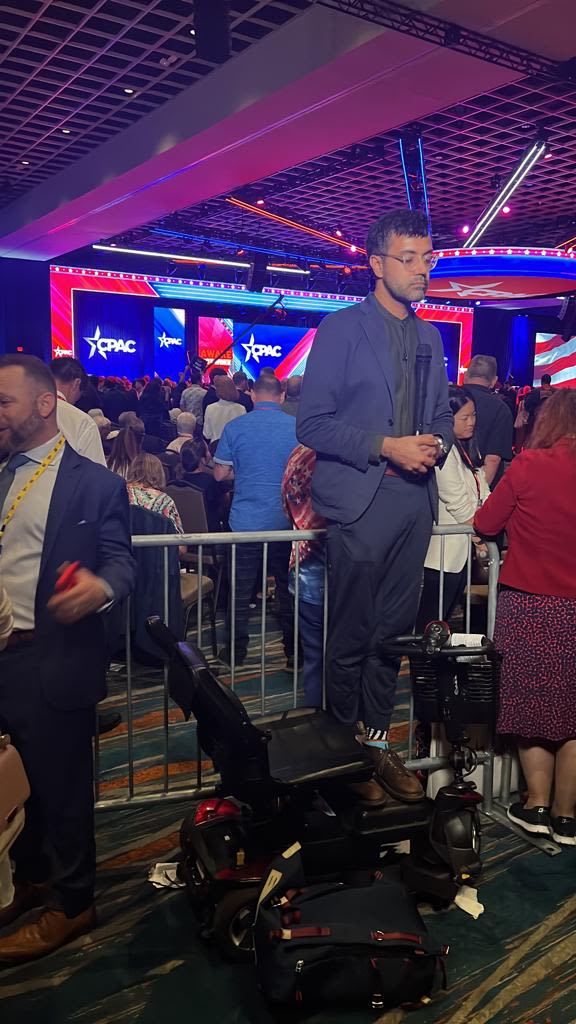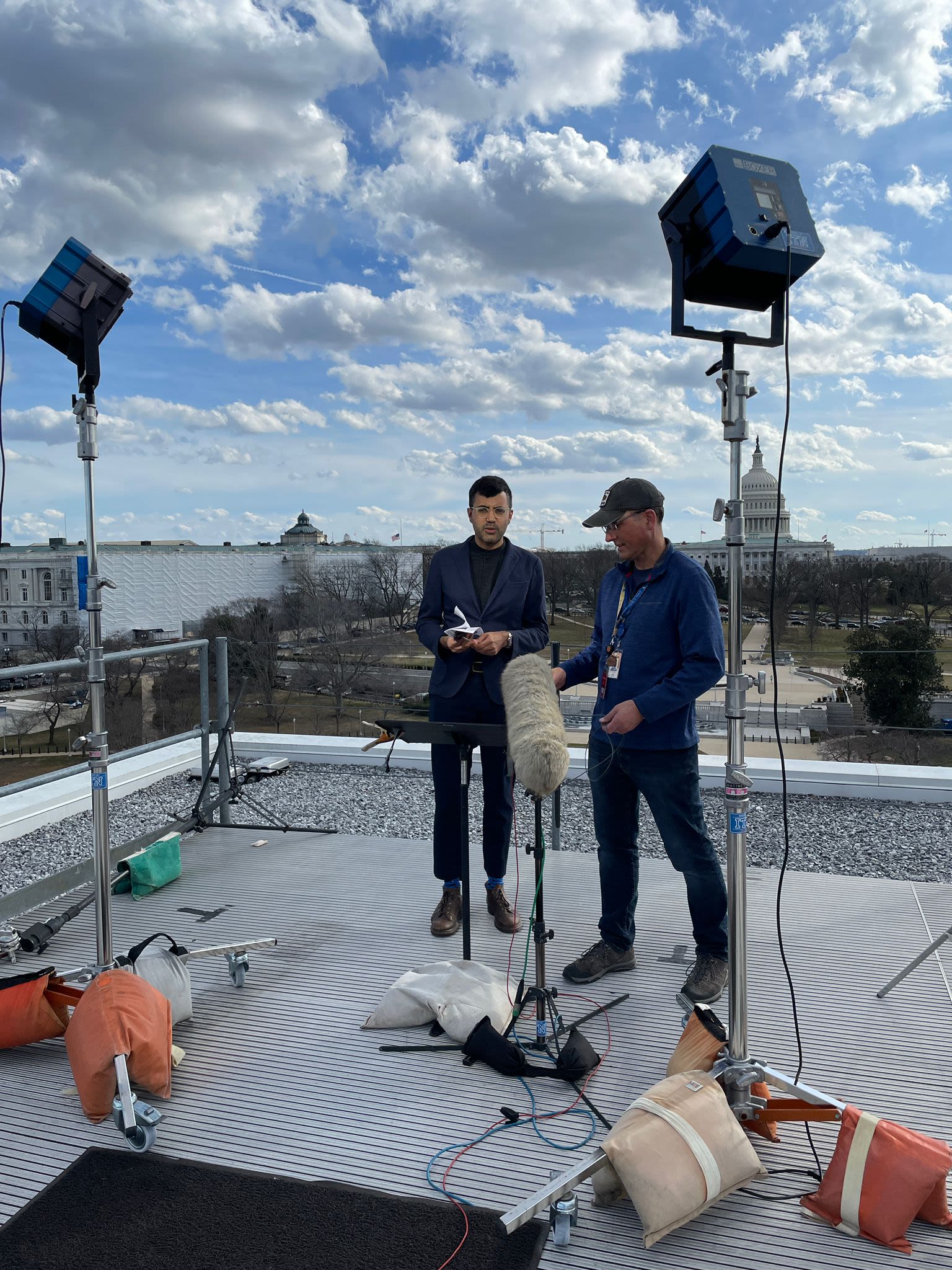The need to uncover
Kiran Moodley (2006) is a reporter for Channel 4 News and host of The Fourcast podcast. We spoke to him about the skills that make a good journalist and some of the unforgettable moments from his career so far.

You have covered a huge range of challenging topics and events throughout your career, and our current geopolitical climate is obviously no exception. Do any stand out for you as particularly moving or memorable?
I was based in Washington during the first years of the Trump administration, and my team and I worked on a story about 2017’s exceptionally high reported murder rate among transgender people in America, the highest in recent history. We went down to Mississippi for a few days in 2018 to report on the death of Mesha Caldwell, who was the first transgender person killed during that year. For me, that was important because it’s a story that wasn’t really covered, especially as the majority of the victims were Black women in the South, and often nobody was brought to justice. I think that given how the trans debate has moved on in recent years, with hatred on both sides, sometimes it’s worth putting into perspective how impossible it can be for some transgender people to live their lives without fear.
Do you have a proudest moment from your career so far?
I’m proud of a lot of the work I’ve done since joining Channel 4 News. Things haven’t really stopped: we’ve had the refugee crisis, war in Syria, the Paris terrorist attacks, Brexit, elections, Trump, the pandemic and now the war in Ukraine, among many others. It has felt like a particularly busy period of history and news that we’ve gone through in the last six years or so, and I’m very proud of the work that I and the team have done in that time.
"Things haven’t really stopped: we’ve had the refugee crisis, war in Syria, the Paris terrorist attacks, Brexit, elections, Trump, the pandemic and now the war in Ukraine, among many others."

In the press pen at CPAC in Orlando waiting for Donald Trump to speak.
In the press pen at CPAC in Orlando waiting for Donald Trump to speak.
What do you think makes an effective broadcast journalist?
Jon Snow, who has sadly just stepped back from Channel 4 after thirty years, always spoke about the importance of empathy.
I also think impartiality is hugely significant. In the past fifteen years or so, we’ve seen the rise of social media, and these platforms can play into and amplify old conspiracy theories which separate us out into more and more categories and tribes. In the UK, we have a regulator, Ofcom, and a sense that there is an attempt to maintain impartiality. It’s one of the great things about British broadcasting, and I’m reminded of that fact when I go to America, where news in general is so partisan on both sides. I was once in the press pen listening to Trump speak at CPAC in Orlando and a member of the public came over to me and said “You’re a Trump fan – right?” I responded that I was a journalist and therefore meant to be impartial – I think people often forget that.
You also have to have a desire to tell stories that haven’t been told elsewhere. Channel 4 has a remit to provide a slightly different type of news that appeals to communities that aren’t often heard from. I’d say empathy, impartiality and that need
to uncover are all really important.
How did the pandemic affect the way you work as a broadcast journalist, and the industry more broadly?
Firstly, the pandemic meant that a lot of journalists, broadcast or otherwise, had to start learning about epidemiology, behavioural science and other topics that we hadn’t encountered before. We had to make sure we knew who the right experts were, what to challenge and what to question. If you look at the history of how governments and journalists have responded to pandemics, like with the Spanish flu for instance, there were so many circumstances of the same mistakes being repeated. I’m not sure I could confidently say that those mistakes won’t be repeated again in the next pandemic.
In terms of production, I come from a journalistic background where you’re taught to be a one-man- band, capable of doing all sorts of things, whether that’s filming, editing, writing, presenting… In the pandemic, particularly in the first months, I had to set up a studio in my room, and film and produce content independently. It’s all gone back to normal now, but it was a good reminder of how important it is that many journalists are able to do that. At no point did Channel 4 News go off-air, at no point were we unable to produce an hour of TV, despite the pandemic being such a challenge. Just as with any news event, it’s amazing how journalists were able to rise to the moment to ensure that a product is able to go to air or to print.
"I’d like to see the material produced for TV and the material produced for online being viewed as equally valuable.”
How have you found the transition into podcasting?
I’ve really enjoyed it because of the depths that podcasts allow you to explore within a conversation. It means I’m not just interviewing reporters, correspondents or anchors from Channel 4 News, I’m also able to bring in outside voices and do interviews with experts and professors, for example. I think that appeals to my undergraduate degree, and the historian within me.
When you’re making TV news, even when you’re producing an hour long programme, you have to condense items into three- or four-minute packages. Sometimes it’s quite tricky to fit everything you want to say. When writing a podcast you can expand on bigger ideas. I find that I as the host, as well as, I hope, the audience, can learn so much more about the topics we cover.
Are there any episodes you would like to highlight?
We recently produced an episode with Matt Frei, who has been in Ukraine since the war broke out, and he discussed his reporting from Kyiv and Lviv, as well as some of his family history.
When I was in Washington, we spoke at CPAC with Dave Weigel, a great Washington Post journalist, about the relationship between American conservatism and the white Christian messianism of Vladimir Putin, and how that can lead to a greater fear of China as a rising power amongst those groups.
I also had a really inspiring conversation with Professor David Halpern, who is CEO of the Behavioural Insights Team, about what he has learned over the last two years during the pandemic.
What are your hopes for the future of the industry – what would you like to see change?
My first journalism job was an internship at PBS News Hour in Virginia, which is an hour-long programme much like Channel 4 News. At PBS, the TV studio and the online team were based in completely separate buildings which were about a 15-minute walk away from each other. It spoke to this division between online and TV news that still very much exists today, though perhaps print journalism has a slightly better connection with its online presence. I think the industry has struggled to level the playing field, and I’d like to see the material produced for TV and the material produced for online being viewed as equally valuable.
We also need to see more diversity both on-screen and behind the scenes, not just in terms of colour but also in terms of class. I think there is a tendency to forget that the industry, like society more widely, is so dominated by privately-educated, middle-class people. I think people from working-class backgrounds and people of colour can be deprived of that inbuilt sense of self-assuredness to apply for the positions that they should do.

Reporting from Washington.
Reporting from Washington.
What part did your time at Clare and at Cambridge play in your journey so far, whether that’s in your working life or your personal life?
I remember choosing Clare when I was doing my A-levels because of my interest in Indian history. I was interviewed by Polly O’Hanlon, who is an expert in the field. Then, when I arrived, she left to go to Oxford!
It was while I was at Clare that I developed a deep love for American history. I’m still in touch with Tony Badger, who was Master at the time, and Andrew Preston, who both played a huge part in that. I then went on to do a journalism degree in America. I’ve worked there at various points in my career, and have developed a lot of expertise in American affairs. It’s now my dream to become Washington correspondent at Channel 4 News. I think I owe a lot of my confidence and knowledge and encouragement to Clare College itself.

